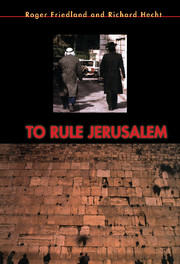Book contents
- Frontmatter
- Contents
- List of Illustrations
- Preface
- Acknowledgments
- Introduction
- 1 A Fearful Fusion
- Part I The Two Zions: Jews Against Zionism in Jerusalem
- 2 Zion Against Zionism
- 3 Black Zion
- 4 Sabbath Wars
- 5 To Control the Center
- Part II Zion Divine: Jerusalem as the Messianic Central City
- Part III Birth of a Nation
- Part IV Heart of Stone
- Notes
- Index
4 - Sabbath Wars
Published online by Cambridge University Press: 13 May 2010
- Frontmatter
- Contents
- List of Illustrations
- Preface
- Acknowledgments
- Introduction
- 1 A Fearful Fusion
- Part I The Two Zions: Jews Against Zionism in Jerusalem
- 2 Zion Against Zionism
- 3 Black Zion
- 4 Sabbath Wars
- 5 To Control the Center
- Part II Zion Divine: Jerusalem as the Messianic Central City
- Part III Birth of a Nation
- Part IV Heart of Stone
- Notes
- Index
Summary
The United Nations chose May 15, 1948, as the day to partition Palestine into a Jewish and an Arab state. This choice presented a problem: May 15 was the Jewish Sabbath. And so Israel officially proclaimed its statehood on Friday afternoon, May 14.
Time is at the heart of the struggle between Zionism and Judaism. The Bible narrates how God created the heavens and earth in six days, and on the seventh, he rested. Religious Jews understand the observance of Shabbat, from sunset Friday to sunset Saturday, both as a ritual reenactment of God's repose and as a reaffirmation of the covenant between God and Israel.
Identity is a matter of orientation, a common attention to particular places and times, to centers that bind a people to one another and identify them as so bound. These spaces, these times, become signs of the collectivity. Different use of time separates one people from another. For millennia, Shabbat observance has been fundamental to Jewish identity. To establish its distinctiveness, the early Christian community sacralized an alternative day. Still later, Muhammad called upon his followers to separate themselves with their own day of gathering.
For religious Jews, Jerusalem is the center of space, the Shabbat, the center of time. Those who hold this city sacred feel bound to protect the order of things; they cannot imagine that here, the most sacred of all places, the divisions of space and time would not be aligned one to the other. It should come as no surprise that in Jerusalem, the haredim, the religious remains of the old yishuv, fight with particular ferocity to defend this most sacred moment.
- Type
- Chapter
- Information
- To Rule Jerusalem , pp. 93 - 121Publisher: Cambridge University PressPrint publication year: 1996

